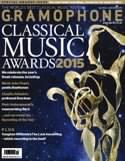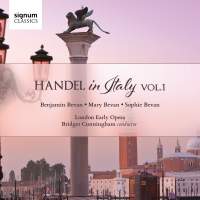Texte paru dans: / Appeared in: |
|
|
Outil de traduction (Très approximatif) |
|
|
Reviewer: David Vickers
The harpsichordist Bridget Cunningham and her ensemble London Early Opera are not to be confused with Christian Curnyn’s longer-established Early Opera Company (also based in London). Their carefully balanced programme certainly ticks conceptual boxes by presenting samples from almost every possible genre for every major Italian city Handel worked in during his grand tour around Italy from late 1706 until early 1710.
The effusive booklet-note misrepresents the fundamental issue that the authorship of the spurious Gloria in excelsis Deo remains uncertain. Since its so-called ‘rediscovery’ in 2001, this misattributed Gloria has now been recorded more than half a dozen times – more often than plenty of more credibly authentic and musically superior soprano motets. However, this is as polished an account as any on account of Sophie Bevan’s unerring sense of decorum for what each movement requires, from intimate piety to extrovert flair. Her sister Mary sings vibrantly in contrasting arias from a Venetian opera (‘Bel piacere’ from Agrippina) and a Roman oratorio (‘Un pensiero nemico di pace’ from Il trionfo del Tempo e del Disinganno). Their uncle Benjamin chips in with an extrovert performance of the cantata Cuopre tal volta il cielo (Naples, 1708), although some uneven strings and the resonant acoustic of St Jude’s, Hampstead, conspire to prevent this from being an ideal interpretation. The Florentine opera Rodrigo is represented with an exquisite passacaglia that features an elaborate concertante violin part played sweetly by Adrian Butterfield.
At the midway point Cunningham expertly plays a G major keyboard sonata written for a double-manual harpsichord and probably dating from Handel’s Italian years. A running time of only 43 minutes is short-shrift, and the presence of two sopranos and a bass invites speculation that either of the Italian-period chamber trios for that combination could have been featured. |
|
|
|
|
|
Cliquez l'un ou l'autre
bouton pour découvrir bien d'autres critiques de CD |
|




